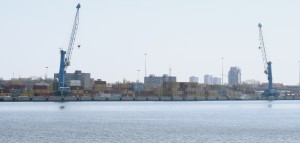KLAIPĖDA, Lithuania — Two Chinese building companies have registered their interest in competing for port upgrade works in a recent trip to the Klaipėda port where they met with local officials.
Artūras Drungilas, Klaipėda Port Authority’s director of marketing, told Baltic Reports that the China Road and Bridge Corporation and the China Communications and Construction Company came to the port city to see the port and make themselves available for work tenders.
“We had several visits from Chinese companies that are interested in infrastructure. They want to do the building work on dredging, railways, quay walls and access roads for the port,” Drungilas said.
The port has plans to upgrade its facilities including building digging deeper channels for larger ships and even building a floating platform for the export of oil products and the import of liquid natural gas. Drungilas said the floating platform was a highly important project with many interested parties across the globe. There is not yet a set date for when the platform would be complete.
“Because it’s a big project, you need to build new breakwaters, we will have to dredge, reclaim land from the sea — this is big project. First of all, we have feasibility study with environmental impact study included that will be done in two years,” he said.
Other than the natural gas and oil platform, which is a long-term project, the port will also be dredged deeper in its central canal and a large terminal be built for cruise ships and cargo facilities.
“We have several short term plans within the existing port: new passenger cargo terminal, RoRo facilities, RoRo pax ships, and cruise ships, too. This is a big project. The value of the project is €50 million,” Drungilas said.
Intra-Baltic port competition
The Lithuania project is part of the heady competition between the eastern Baltic ports for traffic, especially Russian and Belarusian cargo.
Recently Riga announced it would implement a major enlargement of its port, with the aim of taking traffic from Klaipėda in mind. While the city of Riga is three times the size of Klaipėda, Riga’s port has handled only 11 percent more cargo in 2009 than Klaipėda.
Last week Riga Deputy Mayor Ainars Šlesers, also chairman of the board of the Riga Port Authority, said that they would aim to attract Belarusian transit away from Lithuanian ports.
”Due to unsuccessful politics, most of Belarus’ goods go through Lithuania, however, it is still possible to regain this flow of goods and attract Belarus entrepreneurs to use our port,” Šlesers said.
A grain terminal will be constructed at the port, to be be used by local farmers as well as safe terminals for chemical storage.
”We must increase the port’s turnover by 10 million tons next year,” Šlesers said.
Drungilas said that any upgrades in the other Baltic states would be detrimental to Klaipėda’s trade and that they needed to keep up.
”We are competing with Latvian and Estonian ports. Any upgrades there brings upgrades to them and if we don’t upgrade it is a disadvantage to us,” Drungilas said adding that Russia is too big to compete with and that they will always prefer their own ports if they can.













